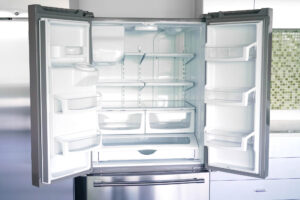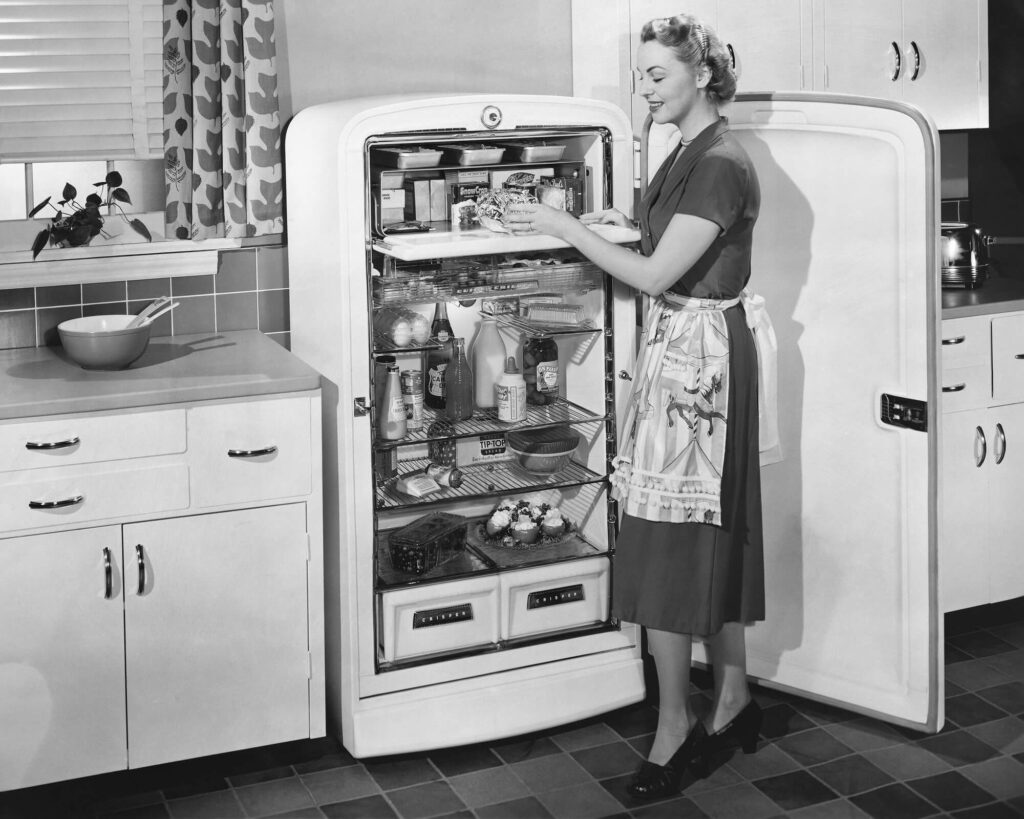Nearly every home in the U.S. now has a refrigerator. And nearly one in four homes have two or more! But as recently as 80 years ago, refrigerators were considered a modern luxury.
As commercial refrigeration specialists, we’ll be the first to tell you: Refrigeration technology has come a long way in the past several decades!
Between the invention of frozen food, and the rise of major cities far from the farms that produce their food, today, effective preservation solutions have become not just a luxury, but a necessity.
Refrigeration actually dates back as early as 1,000 BC.
In China, villagers would harvest ice from local rivers and lakes, then store it in ice cellars specially built to insulate the ice. In other countries, big pits or clay huts were used to store winter’s snow. Then, in summer, these ingenious cooling chambers would be used to keep beverages cool or to preserve food.
But it wasn’t until the 18th century that refrigeration technology shifted away from ice storage to ice-independent artificial refrigeration.

We have these forward-thinking inventors to thank for today’s convenient refrigeration.
In 1748, William Cullen, a Scottish professor at the University of Glasgow, became the first inventor to design a small refrigerator cooled by evaporating liquid into gas. His revolutionary invention worked, but was too impractical for household use.
However, that simple invention paved the way for Benjamin Franklin and John Hadley’s game-changing discovery. By swabbing the bulb of a mercury thermometer, the pair proved that some special substances, like alcohol and ether, actually cooled as they evaporated. They could lower the temperature of water below freezing simply by evaporating these substances—no matter the outdoor temperature.
Years later, American inventor Oliver Evans used Franklin and Hadley’s discoveries to design the first modern home refrigerator. And the refrigeration revolution began.
By the 1920s, refrigerators were becoming more common—and more dangerous.
The first in-home refrigerators were capable of producing a small amount of ice, but they used gasses like ammonia, methyl chloride, and sulfur dioxide as refrigerants. Not only do these gasses carry a distinctly unpleasant smell, many of them caused fatal accidents. The few homeowners that had refrigerators at the time began storing them outside for safe measure.
It became clear that the only way to expand the usage of refrigerators—and win back the public’s trust—would be to develop synthetic alternatives to these toxic chemicals. So Frigidaire, General Motors, and DuPont set out to do just that.
Thanks to the pioneering work of Thomas Midgley, Jr, and Charles Franklin Kettering, Freon quickly became the go-to alternative synthetic for advancing refrigeration technology. Because the “miracle compound” is colorless, odorless, and non-toxic, it was highly regarded as the future of cooling.
The invention of Freon allowed refrigerators to become not just a wealthy luxury, but a household necessity.
Today, refrigerators are more advanced, safe, energy-efficient, and eco-conscious than ever.
We now know Freon is a significant contributor to ozone depletion. But to date, no comparable alternative has been discovered or created. Instead, refrigerators use the Freon alternative HFO-1234yf, or run simply on thermoelectric cooling, which doesn’t require a refrigerant.
As residential and commercial refrigeration continues to develop, we expect to see new alternatives for refrigerant-powered cooling—and even more energy-efficient breakthroughs. Considering nearly every home in the country and millions of businesses are outfitted with at least one refrigerator, even a few small innovations are likely to have a significant impact on national energy usage.

As North and South Carolina’s first-rate commercial refrigeration specialists, we know a thing or two about keeping your company cool!
Refrigeration technology and industrial cooling solutions are far more complex than the ice houses and iceboxes of the 19th century. That means you shouldn’t trust just anyone with your critical cooling maintenance, repairs, and upgrades.
At Refrigeration Heroes, our service-oriented team of refrigeration professionals are licensed and trained to see, solve, and prevent cooling problems. Call (864) 834-4078 in South Carolina or (828) 688-0323 in Western North Carolina to schedule service!

